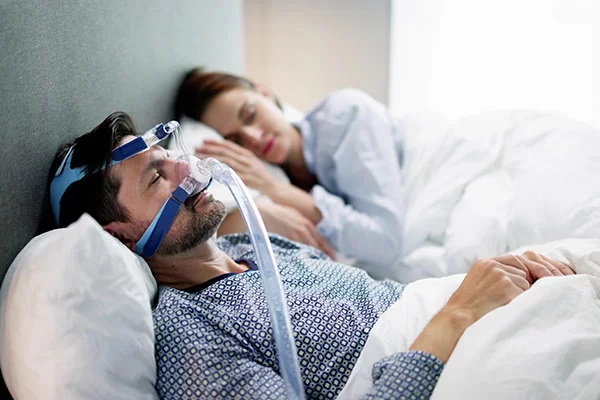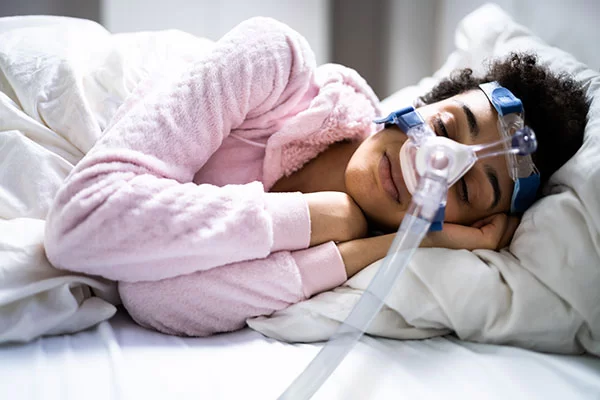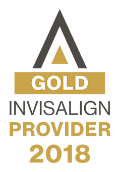Please note we may not offer this treatment at our office. Contact (253) 761-5422 for more information.
Your Path to Restoring Sleep
Sleep apnea is a common disorder that affects millions of people worldwide. If you or a loved one in Tacoma, WA, has been diagnosed with sleep apnea, it’s essential to explore effective treatment options to enhance sleep quality and overall health.
At Petrie Advanced Dental, Dr. Arvind Petrie wants our patients to understand how CPAP (continuous positive airway pressure) therapy can help alleviate sleep apnea and restore your quality of life. Contact our Tacoma dental office today at (253) 761-5422 to schedule an appointment.

Types of Sleep Apnea
Sleep apnea is a disorder marked by pauses or shallow breaths during sleep. The two most common types of sleep apnea are obstructive sleep apnea (OSA) and central sleep apnea (CSA).
Obstructive Sleep Apnea (OSA)
Obstructive Sleep Apnea (OSA) is the most common form of sleep apnea. It occurs when the muscles at the back of the throat relax too much during sleep, which can partially or completely block the upper airway. These blockages lead to episodes of interrupted breathing, often accompanied by loud snoring, gasping, or choking sounds.
Central Sleep Apnea (CSA)
Central Sleep Apnea (CSA) is less common than obstructive sleep apnea (OSA) and has a different underlying cause. It occurs when the brain fails to send the correct signals to the muscles that control breathing. As a result, individuals with CSA may experience episodes of apnea without any obvious blockage in the airway.
What Is CPAP?
CPAP, which stands for Continuous Positive Airway Pressure, is widely regarded as the gold standard treatment for obstructive sleep apnea (OSA). OSA occurs when the upper airway becomes partially or completely blocked during sleep, leading to interruptions in breathing and a decrease in oxygen levels. CPAP therapy utilizes a specially designed machine that delivers a continuous stream of pressurized air through a mask, which keeps the airway open and allows for uninterrupted breathing throughout the night.
Dr. Petrie may recommend CPAP therapy for patients with sleep apnea, as it effectively reduces symptoms and enhances sleep quality. By maintaining airway pressure, CPAP helps prevent episodes of breathing cessation and oxygen desaturation, enabling individuals to achieve restful sleep and wake up feeling refreshed.
How Does CPAP Work?
CPAP therapy consists of three main components:
- CPAP Machine: This compact and portable device generates the pressurized air needed to keep the airways open.
- Mask: Available in various styles and sizes, the mask fits securely over the nose, mouth, or both. It creates a seal that allows the pressurized air to be delivered directly to the airway.
- Tubing: This flexible tubing connects the mask to the CPAP machine, ensuring a continuous flow of air throughout the night.
When a person with sleep apnea wears a CPAP mask and operates the machine, the pressurized air creates a pneumatic splint in the airway. This prevents the airway from collapsing or becoming obstructed, allowing for uninterrupted breathing during sleep.
It’s crucial to have a properly fitting mask to ensure the effectiveness of CPAP therapy. There are various mask options available, including nasal masks, nasal pillows, and full-face masks, tailored to individual needs. A comfortable and secure fit is essential for effective treatment and consistent use.
Benefits of CPAP Therapy
CPAP therapy offers numerous benefits for patients, including:
- Improved Sleep Quality: By providing a continuous flow of oxygen and preventing breathing interruptions (apneas), CPAP users can experience more restful and uninterrupted sleep.
- Reduced Daytime Fatigue: Effective CPAP therapy can help alleviate daytime fatigue and excessive sleepiness, common symptoms of sleep apnea. With better sleep, individuals often feel more alert and focused throughout the day.
- Lower Risk of Health Complications: Untreated sleep apnea can lead to serious health issues such as hypertension, heart disease, stroke, and diabetes. CPAP therapy helps lower the risk of these complications by maintaining adequate oxygen levels during sleep.
- Enhanced Quality of Life: By addressing the symptoms of sleep apnea and improving overall health, CPAP therapy can significantly enhance an individual’s quality of life. Many patients report feeling more energetic, productive, and emotionally stable.

Types of CPAP Machines and Masks
CPAP Machines
There are various types of CPAP machines available:
- Standard CPAP: Delivers a constant, fixed air pressure.
- Auto CPAP (APAP): Automatically adjusts the air pressure to meet the user’s needs throughout the night.
- BiPAP (Bi-level positive airway pressure): Provides different pressure levels for inhalation and exhalation, suitable for specific respiratory conditions.
CPAP Masks
CPAP masks are available in several designs:
- Nasal Masks: These cover just the nose.
- Full-Face Masks: These cover both the nose and mouth.
- Nasal Pillow Masks: These rest beneath the nostrils.
- Hybrid Masks: These combine the features of both nasal and full-face masks.
Selecting the appropriate mask is essential for comfort and the effectiveness of the treatment, and it often depends on personal preferences and specific needs.
Our CPAP Tips
CPAP Proper Maintenance
To keep your CPAP machine in good condition, follow these instructions:
- Regularly clean components to avoid bacteria.
- Replace mask cushions, filters, and tubing as per manufacturer’s guidelines.
- Store the CPAP machine in a clean, dust-free area.
Consistent Usage
To get the best results from CPAP therapy, you’ll want to do the following:
- Use the machine whenever you sleep, including naps.
- Adhere to your prescribed pressure settings.
- Traveling with CPAP is feasible; portable machines are available. Don’t leave your CPAP behind.
Adjusting to CPAP
Many patients may initially find using a CPAP machine uncomfortable. We advise gradually increasing the duration of use to help with adaptation. Be sure to discuss any concerns or discomfort with your healthcare provider to make necessary adjustments.
How Do You Know If You Need a CPAP Machine?
If you suffer from sleep apnea or another sleep disorder, a CPAP machine might be necessary. Common indicators of sleep apnea include:
- Loud snoring
- Observed pauses in breathing during sleep
- Excessive daytime drowsiness
- Morning headaches
- Frequent nighttime awakenings
- Difficulty concentrating
- Mood swings
- High blood pressure
- Being overweight or obese
- Large neck circumference
- Family history of sleep apnea
If you notice several of these symptoms in yourself or if someone has observed these patterns during your sleep, it’s important to consult with a healthcare professional. Self-diagnosing isn’t recommended.
Once you receive an accurate diagnosis, our Tacoma dentist will discuss potential treatments, like CPAP machines.
CPAP Alternatives
Many may find that CPAP isn’t the best option. Luckily, there are many CPAP alternatives available that our Tacoma dentist may recommend:
- Oral Appliance Therapy
- BiPAP Machine
- Surgery
- Lifestyle Changes
- Mouth and Throat Exercises
- Positional Therapy
Frequently Asked Questions
Can CPAP therapy cure sleep apnea?
No, CPAP therapy doesn’t cure sleep apnea, but it’s highly effective in managing the condition. Regular use of CPAP treatment as prescribed can significantly reduce symptoms and enhance sleep quality for those with sleep apnea.
Is CPAP therapy uncomfortable?
Initially, some individuals might find CPAP therapy uncomfortable, especially when getting used to the airflow and wearing the mask. However, with time and a properly fitted mask, most people become accustomed to the therapy and find it more comfortable.
Can I travel with my CPAP machine?
Yes, most CPAP machines are designed to be portable and convenient for travel. Ensure you pack your CPAP machine and its accessories securely, and consider bringing extra supplies to maintain uninterrupted therapy while on the go.
How can I maintain and clean my CPAP equipment?
Regular cleaning of CPAP equipment is essential to prevent bacterial buildup. Follow the manufacturer’s instructions for cleaning the mask, tubing, and humidifier. It’s recommended to use mild, fragrance-free soap and water for cleaning. Maintain proper cleaning practices and replace components as needed to ensure optimal therapy effectiveness and hygiene.
Achieve Restful Sleep and Easy Breathing
If you or a loved one is dealing with sleep apnea, don’t delay in seeking assistance. Take charge of your sleep and overall health by discovering the advantages of CPAP therapy. Contact our committed team at (253) 761-5422 to arrange a consultation and embark on your path to improved sleep and a healthier lifestyle.
Don’t let sleep apnea hold you back any longer—make that call today! We look forward to helping treat sleep apnea so you can get the rest you need. We’re proud to serve patients in Tacoma, Lakewood, Puyallup, Federal Way, Gig Harbor, and University Place.





















